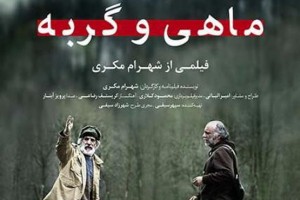 What�s the connection between slasher flicks and the art of M.C. Escher? Both inspired Iranian writer-director Shahram Mokri�s �Fish & Cat,� winner of a special award for innovation at the 2013 Venice Film Festival. The 134-minute thriller, which was shot, astoundingly, in a single take, involves an isolated lake, creepy woods, a group of camping students and a restaurant that may be serving human flesh. But more striking than the movie�s plot is its uncanny chronology, in which time seems to double back on itself.
What�s the connection between slasher flicks and the art of M.C. Escher? Both inspired Iranian writer-director Shahram Mokri�s �Fish & Cat,� winner of a special award for innovation at the 2013 Venice Film Festival. The 134-minute thriller, which was shot, astoundingly, in a single take, involves an isolated lake, creepy woods, a group of camping students and a restaurant that may be serving human flesh. But more striking than the movie�s plot is its uncanny chronology, in which time seems to double back on itself.
Tense scenes unfurl to the strains of ominous music: kite-flying gear mysteriously disappears; a pair of one-armed twins stalks around; a menacing-looking restaurateur carries what looks like a bag of bloody meat. Events recur, but from different angles, all without the camera work ever resorting to a cut.
�Time in this film is like closed circles. Circles which in themselves have circles,� Mokri, 35, said in an e-mail interview, noting that his intent was to give chronology the kind of logic-defying structure that certain Escher images give to architecture, producing an effect that Mokri describes as �always so magical to our mind.�
�Fish & Cat� is one of the highlights of the�19th annual Iranian Film Festival, beginning Jan.�9 at the Freer Gallery of Art. (Mokri is scheduled to appear at the Jan. 16 screening of �Fish & Cat,� which also airs Jan. 18.) Another festival highlight: �Manuscripts Don�t Burn,� by director Mohammad Rasoulof, who shot the thriller in 2013 despite being banned by Iranian authorities from filmmaking for 20 years.
�This is a very strong year,� said Tom Vick, curator of film for the Smithsonian�s Freer Gallery of Art and Arthur M. Sackler Gallery. �Fish & Cat,� in particular, is �quite brilliant,� he says.
�It�s not only the technical achievement of managing to pull off this one-take film, but doing it in such a compelling way,� with the camera moving all the time, said Vick, who curated the festival with Carter Long of Boston�s Museum of Fine Arts and Marian Luntz of Houston�s Museum of Fine Arts.
In a nod to a common suspense-drama trope, �Fish & Cat� opens with an announcement that the story is based on reality. In fact, Mokri said, the film draws on newspaper coverage of a restaurant rumored to be serving kebabs made of human flesh.
Mokri says he heard about the incident when he was a teenager and remembered it decades later while �looking for a story [in] which I could introduce a mood like American slasher films and also talk about today�s Iran society.� A society, he said, �always waiting for something horrible to happen.�
To prepare for the shoot, Mokri and his cast rehearsed extensively � a month in Tehran, where the director lives, and a month in northern Iran. They rehearsed, Mokri said, �just like a theater performance � every single day.�
Still, on the first day of filming, an actor had a memory lapse, and the shoot had to be aborted. But the next day it was successful.
Mokri said that at first it was difficult to get �Fish & Cat� screened in Iran, in part because authorities had interpreted the mention of the year 1998, the movie�s reference to the restaurant scandal, as an allusion to a period of political killings in Iran. But after Hassan Rouhani (who has been described as a relative moderate) became president in 2013, �we had no problems, and we screened the film,� Mokri said.
Censorship was and is �very strong in Iran, both in terms of what you can make and what you can see,� Vick said. But more recently, he added, �because everybody can sneak around the rules and see things online or on satellite dishes,� Iranian directors have been able to enter more fully into dialogue with world cinema.
Mokri certainly seems glad to keep the dialogue going. He recently returned from India, where he served on a film festival jury. �I saw lots of Indian and Bollywood films, and I actually learned a lot,� he said.
Iranian Film Festival�Jan. 9 through Feb. 8 at the Freer Gallery of Art, Jefferson Drive at 12th Street SW. 202-633-1000, Visit
By Washington Post
The Iran Project is not responsible for the content of quoted articles.

 QR code
QR code